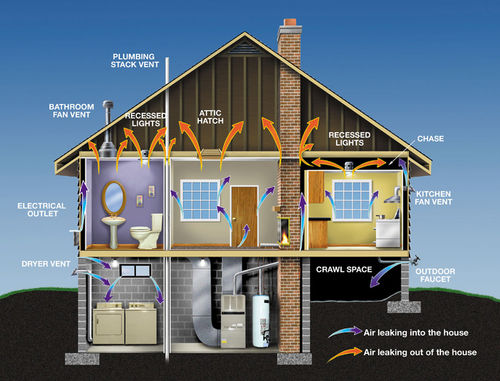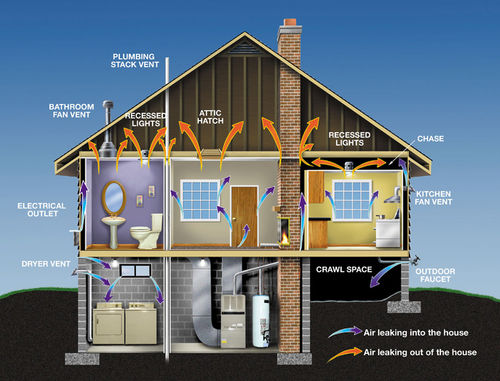Send your question to Umbra!
Q. Dear Umbra,
I’ve heard that tightening up a leaky house is one of the best energy conservation tactics out there. Energy audits could save an enormous amount of fuel. My wife is very much opposed to this because she places a high value on fresh air exchange. Are there health risks to “tightening the residential envelope”?
David G.
Morenci, Mich.
A. Dearest David,
 Your house is breathing too.You can’t teach an old dog new tricks, and apparently it is likewise fairly impossible to stop an older house from leaking at least a bit of healthy fresh air. Most houses which were not tightly built to begin with (usually called “older” and perhaps also “new but shoddy”) have air passing through windows, attics, vents, doors, walls, ducts, and actual holes in the walls. It would be quite a task to thwart each of these air passageways, but doing as much as you can will definitely save you fuel and money.
Your house is breathing too.You can’t teach an old dog new tricks, and apparently it is likewise fairly impossible to stop an older house from leaking at least a bit of healthy fresh air. Most houses which were not tightly built to begin with (usually called “older” and perhaps also “new but shoddy”) have air passing through windows, attics, vents, doors, walls, ducts, and actual holes in the walls. It would be quite a task to thwart each of these air passageways, but doing as much as you can will definitely save you fuel and money.
It might also save you further headaches: In some cases, warm air might be passing partway out of your home, then encountering cold outdoor air, condensing, and forming mold in your walls — just a little example to counter your wife’s unswerving love of your current exchange.
An energy audit will tell you where the major leaks are, and hopefully also give you an indication of the costs and benefits of stopping them. You will also learn about your current ventilation situation. You might be in an unusual situation where your indoor air is for one reason or another poor quality — maybe you have a busted old furnace or a poorly vented stove. Are all your combustion appliances working and vented well? A good energy specialist should be able to diagnose whether problems exist, and tell you how to address them.
If you do decide to go ahead to the indeed wonderfully conserving projects of insulating, caulking, sealing the attic, etc., you can either do it yourself or hire a professional. Should either you or the professional reach such sublime levels of tightening that there is no air inflow, an official home ventilation system should be installed. It is apparently better to make a tight home and have the fresh air follow approved channels than it is to simply rely on the inhale and exhale of your old house.
Energy professionals can test the leakage of your house using such esoteric tools as the blower door, the manometer (tee hee), and the infrared camera. If these items sound exciting to you, contact your local utility or visit the DOE for more information and get started on your energy-saving, conservation-erific house tightening program. I don’t think you’ll regret it.
Warmly,
Umbra




